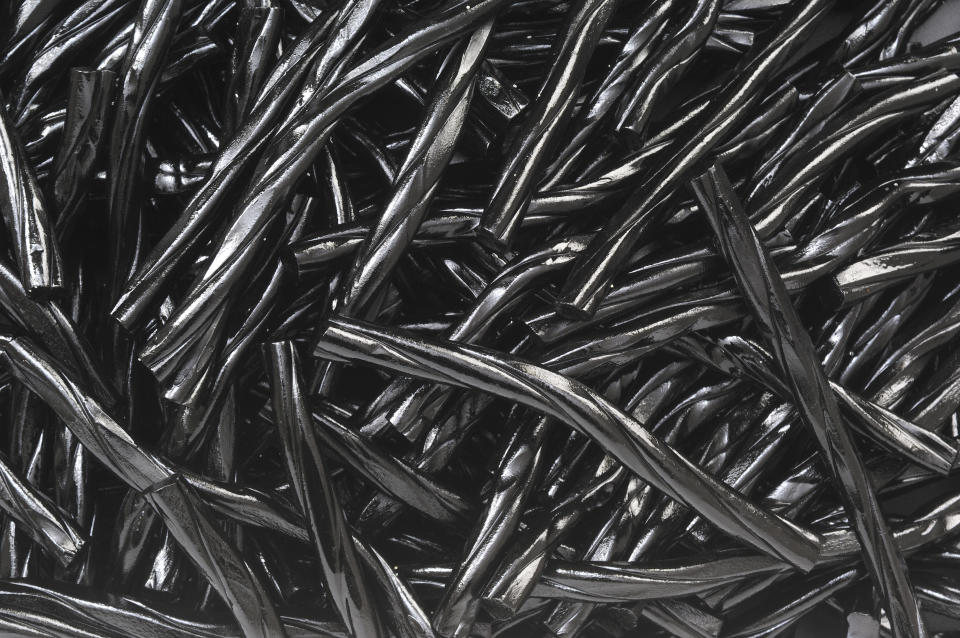Man dies after eating black licorice for several weeks. What you need to know about the candy's effect on your health
A Massachusetts man has died after eating large amounts of black licorice on a daily basis. The 54-year-old’s heart stopped after he ate a large bag and a half of the candy every day for several weeks.
The man’s story is the subject of a case report published in the New England Journal of Medicine. The report details the man’s diet, which was described as “poor” and “consisting primarily of several packages of candy daily.” According to the report, the man “switched the type of candy he was eating” to black licorice three weeks before he suffered cardiac arrest.
The man, who was not publicly identified, had “full-body shaking and loss of consciousness” at a restaurant, per the report. “The shaking movements ceased quickly, but he remained unresponsive,” the report says. Emergency medical personnel arrived on the scene soon after and performed CPR. He was taken to the hospital, where he died the following day.
The report also notes that the man smoked a pack of cigarettes a day for 36 years and had a history of a heroin use disorder, as well as an untreated hepatitis C virus infection.
After family members told doctors about the man’s diet, the doctors concluded that the licorice’s glycyrrhizic acid likely caused an “unimpeded presence of cortisol” that “can cause hypertension, hypokalemia, metabolic alkalosis, fatal arrhythmias, and renal failure — the constellation of signs and symptoms seen in this patient.”
This isn’t a new discovery. The Food and Drug Administration warns that eating just 2 ounces of black licorice a day for two weeks could cause arrhythmia, or irregular heart rhythm, especially for people who are age 40 or older, due to glycyrrhizic acid, aka glycyrrhizin.

Glycyrrhizin can cause potassium levels in the body to fall, the FDA says. And when that happens, some people may experience abnormal heart rhythms, high blood pressure, swelling, lethargy and congestive heart failure.
The issue is so potentially severe that the FDA specifically lists the following warnings about black licorice consumption online:
No matter what your age, don’t eat large amounts of black licorice at one time.
If you have been eating a lot of black licorice and have an irregular heart rhythm or muscle weakness, stop eating it immediately and call your doctor.
This raises some obvious questions about the safety of eating black licorice, but doctors say it’s OK to have the candy in moderation. “It’s important to be mindful of serving sizes,” case report co-author Dr. Neel Butala, a cardiologist at Massachusetts General Hospital, tells Yahoo Life. “But people have been consuming black licorice for many years and most haven’t had issues.”
Dr. Sophia Tolliver, a family medicine physician at the Ohio State University Wexner Medical Center, agrees. “I would recommend cautious consumption,” she tells Yahoo Life.
“Black licorice is definitely safe to eat in small amounts,” Dr. Diane Calello, medical and executive director of New Jersey Poison Information and Education System and an associate professor of emergency medicine at Rutgers New Jersey Medical School, tells Yahoo Life. “The case described involved excessive consumption — over one bag a day — with very limited diet otherwise. But it is important to realize that black licorice does contain a compound that has unique effects. It’s more than just candy.”
Calello points out that glycyrrhizic acid can be found in some foods and beverages other than black licorice sticks, including jelly beans.
There is no set “safe” amount for the general public when it comes to eating black licorice, Calello says, “but people with high blood pressure or heart or kidney disease should be particularly careful and not consume it in large amounts.”
Also keep this in mind, per Butala: “Eating some black licorice does raise blood pressure when consumed chronically. You’re not going to drop dead from it, but if you eat it every day for a long period of time, you might have a higher blood pressure than those who don’t.”
Black licorice can interfere with certain medications and supplements, so it’s important to talk to your doctor if you are on any of these and you eat the candy regularly, Calello says.
Registered dietitian Keri Gans, author of The Small Change Diet, tells Yahoo Life that it’s generally good to abide by this rule of thumb: “If a particular candy comes with a health warning — in this case, black licorice — then I think a person should think twice about it before eating more than one serving at a time.”
Calello says that if you like black licorice, you shouldn’t be overly alarmed. “Everything in moderation,” she says. “Occasional enjoyment of black licorice will not harm you. But it should not be part of your daily diet, particularly if you have underlying conditions which might be worsened by it.”
Overall, Butala stresses that people shouldn’t panic. “I don’t think people should be freaked out about dropping dead from eating black licorice,” he says.
Read more from Yahoo Life:
Want lifestyle and wellness news delivered to your inbox? Sign up here for Yahoo Life’s newsletter.
